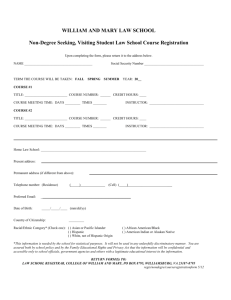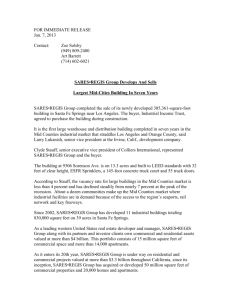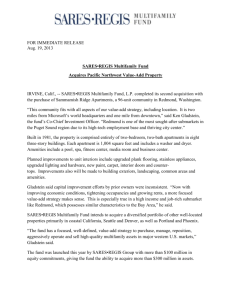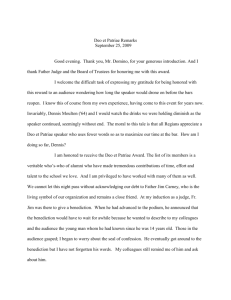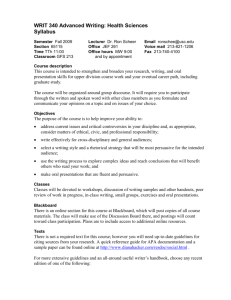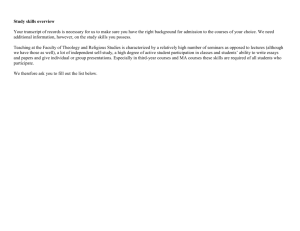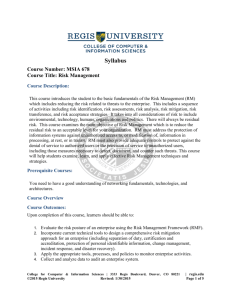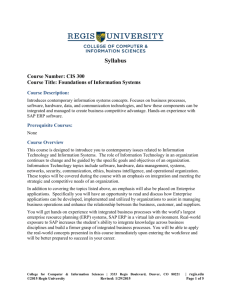fall 2009 section ru01 mw 9:00-10:15 am loyola 06
advertisement
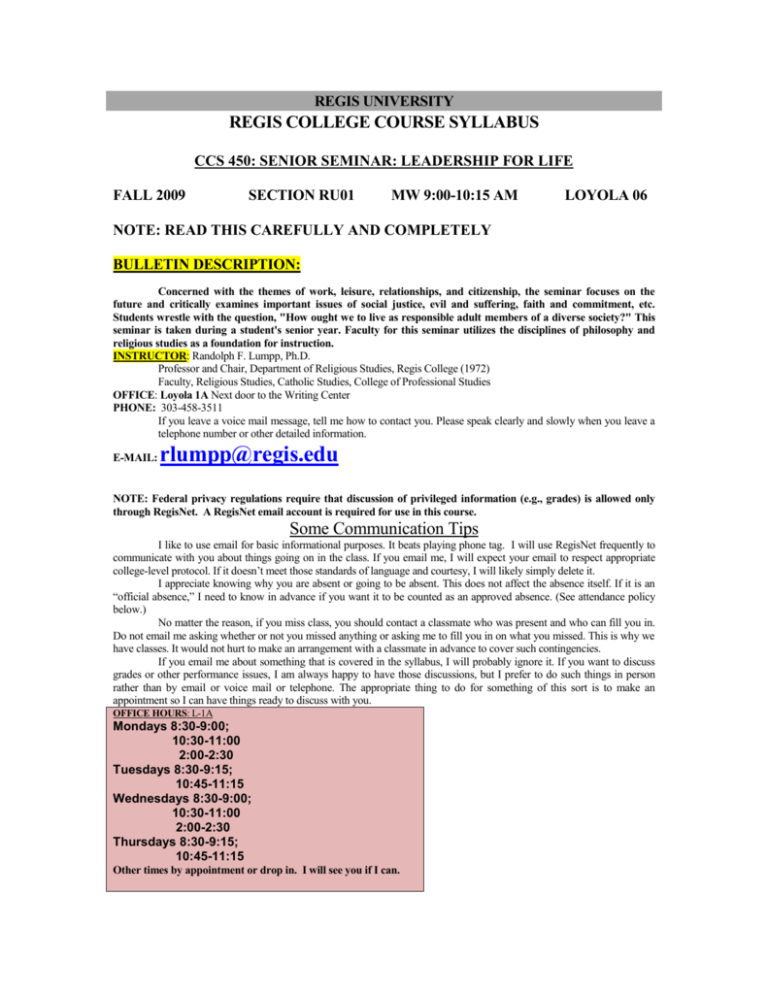
REGIS UNIVERSITY REGIS COLLEGE COURSE SYLLABUS CCS 450: SENIOR SEMINAR: LEADERSHIP FOR LIFE FALL 2009 SECTION RU01 MW 9:00-10:15 AM LOYOLA 06 NOTE: READ THIS CAREFULLY AND COMPLETELY BULLETIN DESCRIPTION: Concerned with the themes of work, leisure, relationships, and citizenship, the seminar focuses on the future and critically examines important issues of social justice, evil and suffering, faith and commitment, etc. Students wrestle with the question, "How ought we to live as responsible adult members of a diverse society?" This seminar is taken during a student's senior year. Faculty for this seminar utilizes the disciplines of philosophy and religious studies as a foundation for instruction. INSTRUCTOR: Randolph F. Lumpp, Ph.D. Professor and Chair, Department of Religious Studies, Regis College (1972) Faculty, Religious Studies, Catholic Studies, College of Professional Studies OFFICE: Loyola 1A Next door to the Writing Center PHONE: 303-458-3511 If you leave a voice mail message, tell me how to contact you. Please speak clearly and slowly when you leave a telephone number or other detailed information. E-MAIL: rlumpp@regis.edu NOTE: Federal privacy regulations require that discussion of privileged information (e.g., grades) is allowed only through RegisNet. A RegisNet email account is required for use in this course. Some Communication Tips I like to use email for basic informational purposes. It beats playing phone tag. I will use RegisNet frequently to communicate with you about things going on in the class. If you email me, I will expect your email to respect appropriate college-level protocol. If it doesn’t meet those standards of language and courtesy, I will likely simply delete it. I appreciate knowing why you are absent or going to be absent. This does not affect the absence itself. If it is an “official absence,” I need to know in advance if you want it to be counted as an approved absence. (See attendance policy below.) No matter the reason, if you miss class, you should contact a classmate who was present and who can fill you in. Do not email me asking whether or not you missed anything or asking me to fill you in on what you missed. This is why we have classes. It would not hurt to make an arrangement with a classmate in advance to cover such contingencies. If you email me about something that is covered in the syllabus, I will probably ignore it. If you want to discuss grades or other performance issues, I am always happy to have those discussions, but I prefer to do such things in person rather than by email or voice mail or telephone. The appropriate thing to do for something of this sort is to make an appointment so I can have things ready to discuss with you. OFFICE HOURS: L-1A Mondays 8:30-9:00; 10:30-11:00 2:00-2:30 Tuesdays 8:30-9:15; 10:45-11:15 Wednesdays 8:30-9:00; 10:30-11:00 2:00-2:30 Thursdays 8:30-9:15; 10:45-11:15 Other times by appointment or drop in. I will see you if I can. CCS 450 SYLLBUS 2 MY SCHOOLS: Wheat Ridge High School (1959); Regis College (1959-60); Seattle University (BA, Philosophy, 1963); Marquette University (MA, Theology, 1968); University of Ottawa (Ph.D., Religious Studies, 1976) ACADEMIC AREAS OF SPECIAL INTEREST: Philosophy of Religion; Catholic Theology; Religion, Culture and Media; World and American Indian Religious Traditions. SOME OTHER THINGS I ENJOY: Being a Boy Scout leader, flying airplanes, cooking, doing photography and listening to music (particularly traditional jazz and classical). SOME THINGS I BELIEVE ABOUT COLLEGE EDUCATION: I believe going to college is a privilege, not a requirement and not a right. I believe that there are very few, if any things at all, that you cannot learn someplace besides school. I believe that learning is a collaborative process that requires respect, commitment and a willingness to participate and share. I believe in the Jesuit philosophy of education which is and has been to prepare people to be constructive agents and leaders in their communities. I believe that traditional undergraduate education is about growing up and getting one's head on straight for entering responsible adult roles in society and community. I believe that college students in general, and college seniors in particular, should be considered adults unless/until their behavior indicates otherwise. I believe that, no matter what one is doing, one ought to try to do one's best. REQUIRED TEXTS AND MATERIALS FOR THIS COURSE: Baron, Renee. What Type am I? New York: Penguin Books, 1998. [ISBN 0-14-02.6941 X] Other materials are posted on my website at academic.regis.edu/rlumpp in the file for this course Additional materials are on reserve in Dayton Memorial Library (listed in my page at academic.regis.edu/rlumpp will be sent by email will be presented discussed in class LEARNING OBJECTIVES FOR THIS COURSE: At the end of this course, students should be able: To demonstrate the relationship between their own learning at Regis College and the Regis University Mission, particularly in terms of “Leadership in Service of Others”; To use particular analytic and interpretive tools, personality type theory and generations analysis to describe their context in life, particularly their own strengths and weaknesses; To discuss, in the context of their own experience and their intentions for life after college (SWOT); To identify, issues and challenges associated with preparing for leadership in service to others in their relationships, work, citizenship and leisure; To demonstrate the ability to engage in working effectively with others to address real life issues in their communities and the world COURSEWORK AND EVALUATION Attendance and participation: Presentations Writing Assignments 20% 30% 50% Grade Equivalent Ranges for Point Scores: A = 93.0-100 points; A- = 90.0-92.99%; B+ = 88.0-89.99%; B = 82.0-87.99%; B- = 80.0-81.99%; C+ = 78.0-79.99%; C = 72.0-77.99%; C- = 70.0-71.99%; D = 65.0-69.99%; F = 64.99% or below CCS 450 SYLLBUS 3 ATTENDANCE, PARTICIPATION, DECORUM (20%) Required and expected at all class sessions. Attendance Scoring: An “absence” means missing all or part of a 75 minute class. 2 absences are allowed without penalty; for each additional absence, REGARDLESS OF THE REASON, attendance points will be reduced by ¼ of the 20% attendance grade. Absences due to official University activities such as varsity athletics must be cleared in advance according to established procedures. “Cleared” means reported and posted in the instructors record. Otherwise they will be unexcused. Appropriate documentation must be provided. If you anticipate problems that will make absence necessary, inform the instructor in writing immediately. It is each student’s responsibility to inform the instructor in writing about relevant changes in the event schedules, including unpredicted tournament events. In the event of serious or prolonged illness, or other conditions that will cause lengthy or numerous absences, notify the instructor immediately (or ask the Office of Student Life to notify the instructor). While there may be some alternative way to participate and satisfy course requirements, prolonged or frequent absence may mean that withdrawal from the course will be necessary. The participatory nature of this course requires regular attendance. It is the student’s responsibility to keep the instructor and his/her teammates informed and to complete assigned work in an appropriate and timely fashion. Incompletes will be granted only when requested in writing (use the form available at Regis College Dean’s Office) and when a mutually satisfactory completion plan has been arranged with and approved by the instructor. If you enter the classroom after roll has been taken, you must inform the instructor before leaving the classroom at the end of the hour in order to receive a late or tardy indication in your record rather than an absence. After that, it will be counted as an absence. Three late arrivals count as 1 absence. If you are ill with something contagious (e.g., the swine flu), stay home rather than share the condition with others. The instructor appreciates being informed about reasons for absence. If you cannot reach me by phone, leave a message on my voice mail or email. Please do not leave and reenter the classroom after class has begun. It is distracting and annoying. Be prepared by using the restroom or obtaining tissues before class starts. If you must leave before class is dismissed, quietly gather your belongings and leave as quietly as possible. PARTICIPATION: Attendance includes being prepared for class, active involvement in classroom activities and scheduled presentations. Participation will include preparation of classroom presentations on various topics. Lack of preparation and/or participation may cost attendance points. CLASS PRESENTATIONS (30%) THE PRESENTATIONS WILL BE ORGANIZED IN CLASS CCS 450 SYLLBUS 4 PRESENTATION CHARACTERISTICS/EVALUATION CRITERIA 1. Effective Time Management 2. Logical Organization 3. Appropriate use of Resources and Documentation 4. Effective use of Media (Power Point, Internet, DVDs….) 5. Useful handout (PP slides or 1 sheet. Offer to email PP slides on request) Header Form: Smith/C450FA09/Guardians 6. Covered the Topic 7. Relevant to Class 8. Cooperative Teamwork (Where required) 9. Contact Information WRITING ASSIGNMENTS (50%) RATIONALE: A major component of all core seminars and of the Regis College Core program generally is the practice and development of reading, thinking and writing abilities. The Senior Seminar is no exception. The focal point for Senior Seminar writing is critical reflection. In keeping with the course description for Senior Seminar, writing will take the form of a number of formal essays. The idea of these essays is to observe carefully, to ask and engage in serious questioning about life issues and to reflect on appropriate ways to deal with them. Producing these essays is a project for the entire course. The final product should display serious use of resources available for the course. Among these resources are the textbooks, lectures, class presentations and discussions, books on reserve in DML, online sources, careful observation of persons and situations from one’s own past and present. FIVE ESSAY ASSIGNMENTS: 1. Analytic Essay on Relationships: Use of the tools presented in class (type/temperament, generations, birth order) to observe and interpret my world of human relations. 2. Analytic Essay on Work: Use of tools presented in class (type/temperament, generations, birth order) and other relevant resources (e.g., online, DML, in-class presentations on special topics) to examine what is “good work” for me in light of my intentions, my major, and the Regis University Mission. This assignment includes an Achievement Based Resume (evaluated by Career Services—Details in class) . 3. Analytic Essay on Citizenship: Use of tools presented in class (type/temperament, generations, birth order) and other relevant resources to explore ways in which I am and intend to be a citizen of my local community, my nation, the world, particularly in light of the Regis University mission of “Leadership in Service of Others.” 4. Analytic Essay on Leisure: Leisure (Greek: schole; Latin: schola= “leisure”). This has to do with how I spend and intend to spend my disposable time, treasure, and talent. It includes a Personal Mission Statement. CCS 450 SYLLBUS 5 5. Synthetic Essay on the Future (Life after College): Brings together the tools and analyses from the course as a whole and one’s previous essays to anticipate what will begin to happen after commencement and how one intends to deal with it. FORMAT FOR WRITING ASSIGNMENTS: All material submitted typewritten (10-12 point), double-spaced, 1 inch margins on all sides; proper Standard American English grammar and spelling. No folders or binders. Stapled or clipped in upper left hand corner. Type fonts can be Times New Roman or Courier or the equivalent. No novelty fonts. Proper MLA headers (last name and page numeral) should appear on each page. No email submissions. If you ignore these instructions, it will affect the grade. HEADING: Top left-hand corner of page 1: Student Name CCS 450 RU01 Essay # Date Submitted REFERENCES: Although the writing for this course is not strictly speaking research, it is expected that use of sources, texts, people, films, or whatever, will be inevitable. Any material taken from someone else should be properly cited in text. Cite only sources actually used. Citing author and page parenthetically at the appropriate place in your discussion can do this: (Taylor 175). A complete list of WORKS CITED arranged alphabetically by authors’ last names must be added at the end of each paper. Authority for form will be D. Hacker. A Writer’s Reference. 4th Ed. NOTE: The style required here is MLA. NOTE ON DEADLINES: Completed writing assignments are due in their entirety at class time on the designated date. Assignments will not be accepted in parts. An automatic 10% penalty will be assessed for assignments submitted after the class period in which they are due. An additional 10% will be assessed for each 24 hour period beyond that. Computer or printer complications, for example, will not be an excuse. Plan ahead. COURSE STRUCTURE THEMES TOOLS Relationship Type/Temperament Work Generation Analysis Citizenship RESOURCES Family and Friends Faculty/Staff Academic Learning Community Experience CCS 450 SYLLBUS 6 Library/Librarians Internet Leisure Date M 8/24 W 8/26 M 8/31 W 9/2 M 9/7 W 9/9 M 9/14 W 9/16 M 9/21 W 9/23 M 9/28 W 9/30 M 10/5 W 10/7 M 10/12 W M W M W M W M W M W M W M W W 10/14 10/19 10/21 10/26 10/28 11/2 11/4 11/9 11/11 11/16 11/18 11/23 11/25 11/30 12/2 12/9 S AT 12/12 MW SCHEDULE OF CLASSES SPRING 2009 Theme Activities Presentations Intro MBTI ADMIN Syllabus Process MBTI Millennials PP LABOR DAY Assignments Barron 1-40 NO CLASS Paper 1 Due Paper 2 Due MID-TERM BREAK NO CLASS Paper 3 Due Paper 4 Due NO CLASS FINAL Commencement Paper 5 Due
